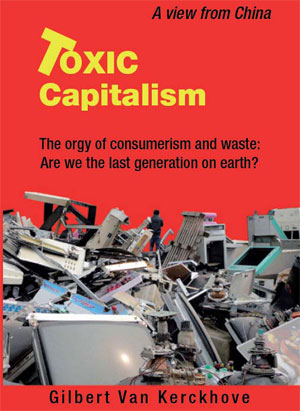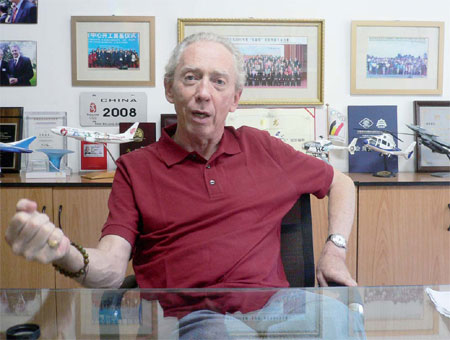Caught in the blame game
Updated: 2012-11-16 11:27
By Meng Jing (China Daily)
|
|||||||||||
|
Gilbert Van Kerckhove talks about the impact of over-consumption in the world. Meng Jing / China Daily |

Writer claims china is under attack for the West's hyper-consumption and is being unfairly targeted for causing scourge of global warming
The West is putting China in a no-win situation: Not only is the Middle Kingdom a victim of Western over-consumption, but it is also the target of abuse, blame and scrutiny by the West, says a foreign expert.
One of the most active expatriates in Beijing, 64-year-old Gilbert Van Kerckhove says one of the main arguments in his first published book Toxic Capitalism is that the West blames China for global levels of pollution and for failing to fairly treat its labor force.
"People in the US protest here at Apple, asking the company to do something about Foxconn, which produces iPhones and iPads. They blame Chinese factories for pollution, for not taking care of the environment and not respecting workers. Why? It is (because) consumers in the US want to have cheap products," he says.
Van Kerckhove's book, released in the United Kingdom in August and currently being translated into a Chinese version, is about the impact of over-consumption in the world, though, a large part is devoted to China.
"People see that China goes out to the world, buying up companies, mining operations and other resources, putting strains on world markets and increasingly competing with the West. But the reason behind the trend is that the more the West consumes, the more it buys from China, the more China needs," says Van Kerckhove from his office in his two-story apartment near Beijing's Workers' Stadium.
He believes the dramatic global environmental deterioration as well as global warming and the frantic quest for natural resources are all linked to a strain of capitalism that has spread throughout the world.
Van Kerckhove derives his arguments from his time as a Beijing senior consultant, a negotiator for state-owned enterprises and director of various foreign chambers of commerce in China. The Belgium-born writer is also a long-term resident of China - in his own words he has been "surviving Beijing since 1980" - and emphasizes that "the blame from the Western side for the pollution China has made is all true, so I also talk about (that) in my book, which is jampacked with a lot of data, much of which is from China. Most of the data don't look pretty".
The tall, thin, energetic man says though he considers China his home - he holds a Chinese green card as a result of his accomplishments in China, including the 2005 Friendship Award, the highest honor for foreigners in the nation - he is not a typical China fan.
"I'm not that kind of foreigner who always says, 'Oh I love China and I love Chinese food.' The decades of experience as the go-between in facilitating communication between international business communities and national and local Chinese governments show that being neutral is very important," he says.
In the 1980s, he was one of the first foreigners to do business in China. He set up a Chinese division for ACEC, a Belgian electrical engineering company, helped with China's Henan Pingdingshan power station project and lent his expertise to secure the first government soft loan to China. He has a master's degree in electronic engineering and has lived on and off in China working for various companies, including Siemens and Alstom. At the end of 1999 when Van Kerckhove and his wife decided to settle down in Beijing and set up Beijing Global Strategy Consulting Co, which helps foreign companies enter China and helps Chinese companies going abroad.
After arriving in Beijing, Van Kerckhove became a senior consultant for the Beijing Investment Promotion Bureau. His work at the bureau grabbed the attention of a Beijing Olympic planning committee, who asked him to pitch in with the preparatory work for the 2008 Olympics.
"It was in 2001, they called me and said, 'We have a very big problem. We have no money. Can you find money for us?'" Van Kerckhove says.
He says he proposed a unified bidding concept for the design, construction, financing and operations of the Olympics to a legion of foreign embassies, chambers of commerce and potential overseas investors. His work is directly responsible for the financing of the Water Cube and the Bird's Nest, two most important venues of the Games.
"I was called the fireman during the period, in which I was proved myself to be problem solver. I fixed all kinds of problems from organizing a dinner party - it was during SARS, so you can imagine how difficult it was to invite the foreign business community to come - to negotiating contracts."
He says the main reason he was offered a Chinese green card in 2008 - less than 5,000 out of the around 500,000 registered foreigners in China are holders - is because of his achievements in the Olympics. His experience during the Olympics helped him maintain close connections with the government, foreign embassies and chambers of commerce. Most importantly, he gained more knowledge of China's laws that govern the bidding process in China, where projects, mostly government procurement ones, require companies to make an offer to the local or central government.
In 2005, he was asked to set up a working group on government procurement - a major market access barrier in China - by the European Chamber of Commerce in Beijing and has been leading it since then. In September, the group attended the 15th China-EU Summit in Brussels, where Van Kerckhove explained the difficulties faced by European companies in China.
"A lot of the problems (in government procurement) are still the same. But this year is more serious than in previous years because ... we see a trend today that people are having second thoughts about investing in China," says the writer, who adds that some European companies are relocating their factories to eastern Europe and Africa.
"But China's role as the world's factory is not going to change (so) easily. China is one of the biggest markets in the world. So even if there is relocating, European investors are not closing down their factories but instead using them for China's home market," he says. "The most important thing I mentioned in my book is that Chinese companies need to go for more value-added products. Firstly, the West need to pay more so Chinese factories can have a much more comfortable margin. Secondly they need to buy high-quality goods which are more durable, consuming less and wasting less."
As a frequent public speaker on issues about the Chinese economy, business, environment and society, Van Kerckhove says Toxic Capitalism was partly spurred by his experiences as a marathon runner in Beijing since 2003. He says the city's pollution has caused him a host of health problems.
Currently, his busy schedule is packed with high-level forums, functions with ambassadors, charity work with the Beijing Rotary Club, Chinese language lessons and even karaoke.
He says he is also a frequent visitor to nightclubs near his apartment so that he can talk and learn more about youth in China.
"I haven't taken one day off in the past six years because I am always busy with my social life and business. I will try to do more writing in the future."
Van Kerckhove says that China Youth Press, the publisher of the Chinese version of Toxic Capitalism, is considering translating his work into other languages.
mengjing@chinadaily.com.cn
(China Daily 11/16/2012 page30)
Today's Top News
Rescuers race against time for quake victims
Telecom workers restore links
Coal mine blast kills 18 in Jilin
Intl scholarship puts China on the map
More bird flu patients discharged
Gold loses sheen, but still a safe bet
US 'turns blind eye to human rights'
Telecom workers restore links
Hot Topics
Lunar probe , China growth forecasts, Emission rules get tougher, China seen through 'colored lens', International board,
Editor's Picks

|

|

|

|

|

|






